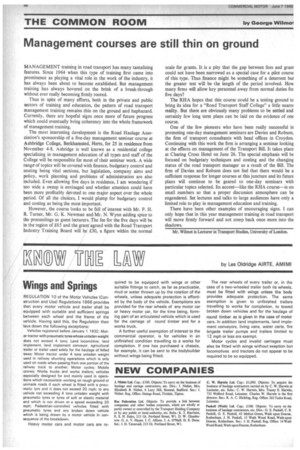Management courses are still thin on ground
Page 100

If you've noticed an error in this article please click here to report it so we can fix it.
THE COMMON ROOM by George Wilmoi
MANAGEMENT training in road transport has many tantalizing features. Since 1964 when this type of training first came into prominence as playing a vital role in the work of the industry, it has always been about to become established. But management training has always hovered on the brink of a break-through without ever really becoming firmly rooted.
Thus in spite of many efforts, both in the private and public sectors of training and education, the pattern of road transport management training remains thin on the ground and haphazard. Currently, there are hopeful signs once more of future progress which could eventually bring coherency into the whole framework of management training.
The most interesting development is the Road Haulage Association's sponsorship of a five-day management seminar course at Ashbridge College, Berkharnsted, Herts, for 25 in residence from November 4-8. Ashridge is well known as a residential college specializing in management education of all types and staff of the College will be responsible for most of their seminar work. A wide range of topics will be covered with finance, budgetary control and costing being vital sections, but legislation, company aims and policy, work planning and problems of administration are also included. Even allowing five days in residence, I am wondering if too wide a sweep is envisaged and whether attention could have been more profitably devoted to one major aspect over the whole period. Of all the choices, I would plump for budgetary control and costing as being the most important.
However, the course looks to be full of interest with Mr. P. H. R. Turner, Mr. G. K. Newman and Mr. N. Wynn adding spice to the proceedings as guest lecturers. The fee for the five days will be in the region of £65 and the grant agreed with the Road Transport Industry Training Board will be £30, a figure within the normal
scale for grants. It is a pity that the gap between fees and grant could not have been narrowed as a special case for a pilot course of this type. Thus finance might be something of a deterrent but the greater test will be the length of the period involved. How many firms will allow key personnel away from normal duties for five days?
The RHA hopes that this course could be a testing ground to bring its idea for a "Road Transport Staff College" a little nearer reality. But there are obviously many problems to be settled and certainly few long term plans can be laid on the evidence of one course.
One of the few pioneers who have been really successful in promoting one-day management seminars are Davies and Robson, the firm of transport consultants with head offices in Croydon. Continuing with this work the firm is arranging a seminar looking at the effects on management of the Transport Bill. It takes place at Charing Cross Hotel on June 26. The special emphasis will be focused on budgetary techniques and costing and the changing status of the road transport manager as a result of the Bill. The firm of Davies and Robson does not feel that there would be a sufficient response for longer courses at this juncture and its future plans will continue to be geared to one-day seminars with particular topics selected. Its accent—like the RHA course—is on small numbers so that a proper discussion atmosphere can be engendered. Set lectures and talks to large audiences have only a limited role to play in management education and training.
There have been other examples of encouraging signs. I can only hope that in this year management training in road transport will move firmly forward and not creep back once more into the shadows.
Mr. Wilmot is Lecturer in Transport Studies, University of London.
















































































































































